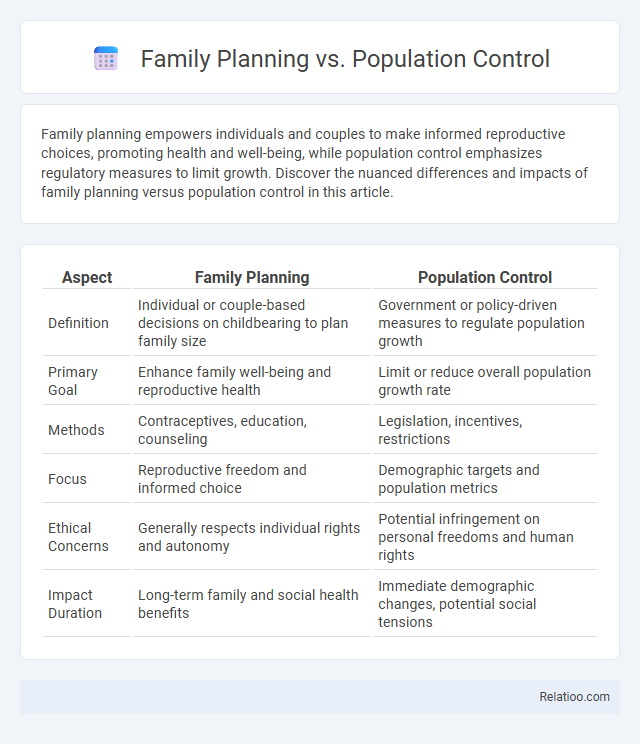Family planning empowers individuals and couples to make informed reproductive choices, promoting health and well-being, while population control emphasizes regulatory measures to limit growth. Discover the nuanced differences and impacts of family planning versus population control in this article.
Table of Comparison
| Aspect | Family Planning | Population Control |
|---|---|---|
| Definition | Individual or couple-based decisions on childbearing to plan family size | Government or policy-driven measures to regulate population growth |
| Primary Goal | Enhance family well-being and reproductive health | Limit or reduce overall population growth rate |
| Methods | Contraceptives, education, counseling | Legislation, incentives, restrictions |
| Focus | Reproductive freedom and informed choice | Demographic targets and population metrics |
| Ethical Concerns | Generally respects individual rights and autonomy | Potential infringement on personal freedoms and human rights |
| Impact Duration | Long-term family and social health benefits | Immediate demographic changes, potential social tensions |
Introduction to Family Planning and Population Control
Family planning involves providing individuals and couples with information, education, and access to contraception to enable informed reproductive choices and improve maternal and child health. Population control refers to governmental policies aimed at regulating population growth through measures such as birth rate reduction and family size limitations. Understanding the differences highlights that family planning centers on individual autonomy and health benefits, while population control emphasizes demographic management and economic or environmental objectives.
Defining Family Planning: Goals and Methods
Family planning focuses on enabling individuals and couples to anticipate and attain their desired number of children through effective methods such as contraception, fertility education, and reproductive health services. Unlike population control, which aims to regulate population growth often through government-imposed measures, family planning prioritizes personal choice, health, and well-being. Understanding the goals and methods of family planning helps you make informed decisions about reproductive health, ensuring autonomy and healthy family outcomes.
Understanding Population Control: History and Policies
Population control refers to government policies aimed at regulating the growth rate of a country's population through measures such as birth limits, sterilization, or incentives for smaller families. Historically, population control emerged in the 20th century as a response to rapid population growth, with notable examples including China's One-Child Policy and India's sterilization campaigns. Understanding these policies helps you distinguish between coercive population control methods and family planning, which emphasizes voluntary reproductive choices and access to contraception for healthier families.
Key Differences Between Family Planning and Population Control
Family planning focuses on enabling individuals and couples to decide the number and spacing of their children through access to contraception, education, and reproductive health services, emphasizing personal choice and well-being. Population control involves government or policy efforts to regulate population growth rates, often through mandates, incentives, or restrictions aimed at controlling demographic trends. The key difference lies in family planning prioritizing voluntary reproductive choices and health empowerment, while population control emphasizes demographic targets and regulatory measures.
Ethical Considerations in Family Planning vs Population Control
Ethical considerations in family planning emphasize respecting individual autonomy, reproductive rights, and informed consent, ensuring that Your decisions about childbearing are voluntary and free from coercion. In contrast, population control often raises ethical concerns due to its potential for coercive measures, human rights violations, and discriminatory practices targeting specific groups. Balancing these ethical issues is crucial for creating policies that support reproductive freedom while addressing demographic challenges responsibly.
Impact on Women’s Health and Rights
Family planning empowers women by providing access to contraceptive methods, improving reproductive health, and enabling informed choices about childbearing, which directly enhances their autonomy and rights. Population control often imposes restrictive measures that can undermine women's health and limit their reproductive freedom, potentially leading to human rights violations. Prioritizing family planning over coercive population control ensures respect for women's rights while promoting healthier communities through voluntary and informed reproductive decisions.
Socioeconomic Implications of Both Approaches
Family planning empowers individuals with reproductive autonomy, contributing to improved maternal and child health, higher education levels, and economic growth by enabling better resource allocation within families. Population control methods often involve government-imposed measures that can lead to ethical concerns, social unrest, and economic disparities if implemented without respecting human rights. Socioeconomic implications of family planning emphasize sustainable development through informed choices, whereas population control risks undermining social equity and long-term economic stability.
Global Perspectives: Case Studies and Success Stories
Family planning initiatives promote reproductive health by empowering individuals with contraception access and education, fostering voluntary choices rather than coercive measures. Global success stories, such as Bangladesh's community health worker model and Rwanda's integrated family planning programs, demonstrate remarkable declines in fertility rates and improvements in maternal health through culturally sensitive, rights-based approaches. In contrast, population control policies, often associated with coercion, have faced ethical criticism and resistance, underscoring the effectiveness of family planning strategies centered on empowerment and informed consent.
Challenges and Controversies in Implementation
Challenges in implementing family planning arise from cultural resistance and misinformation, often complicating efforts to ensure access to contraceptives and reproductive health education. Population control measures frequently face ethical controversies related to personal freedoms and human rights, causing public backlash and policy enforcement difficulties. Your engagement in addressing these hurdles can help promote informed choices and equitable family planning services without infringing on individual rights.
The Future of Reproductive Health Policy
Reproductive health policy increasingly emphasizes family planning as a rights-based approach centered on individual choice, contrasting with population control strategies historically driven by demographic targets. Advances in technology and data analytics enable personalized family planning services that improve health outcomes while respecting autonomy and diversity. Future policies integrate sustainable development goals, ensuring equitable access to contraception and education, fostering healthier populations and empowering reproductive decision-making worldwide.

Infographic: Family Planning vs Population Control
 relatioo.com
relatioo.com